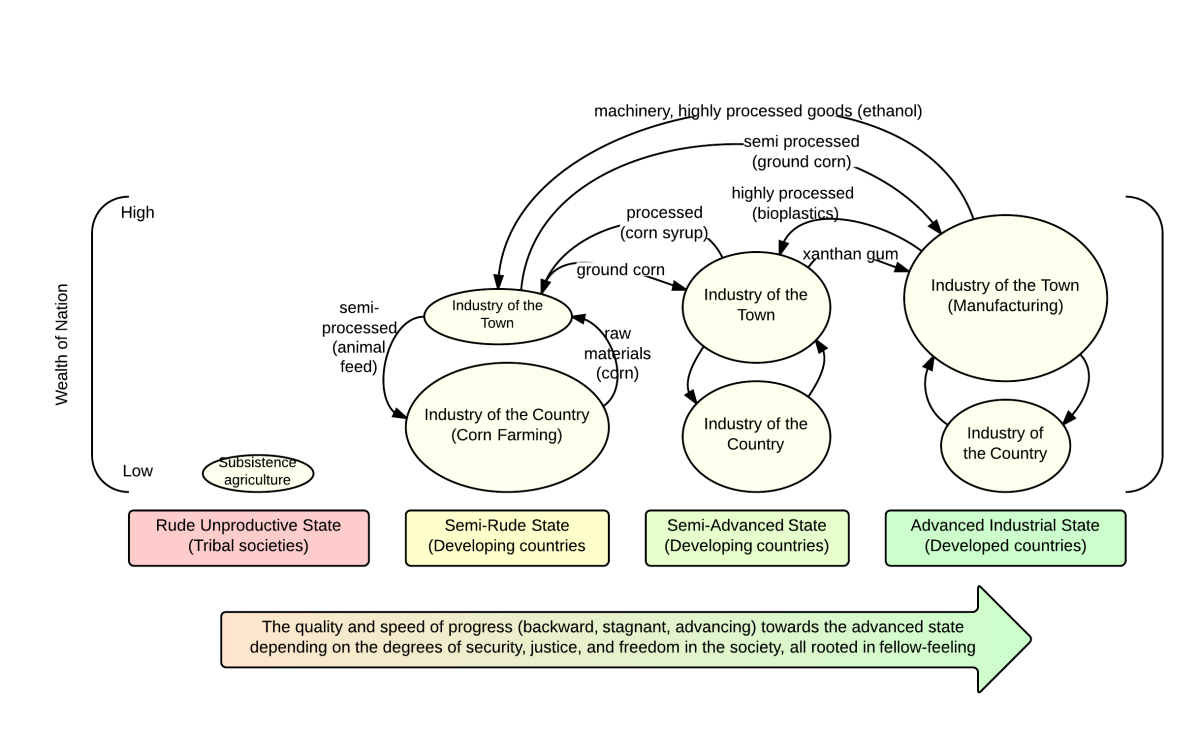Socio-economic Suggestions for the Tasmanian Economy
Table of Contents
A few days ago, ABC reported that the Tasmanian economy was showing signs of recovery after being at the bottom of the nation last year.
- ‘State final demand’ has risen to 2.3% compared to 1.3% for the national average
- Unemployment was down 0.2% compared to a 0.1% increase in the mainland

Tasmania’s Economic Decline
Most articles point to the decline of the forest-products industry , specifically wood-chip processing, as the cause of Tasmania’s current economic problems. For example, Gunns, one of the largest forest-product company, started closing down in 2012 , contributing to the current decline by axing jobs and rendering its assets of less worth.
The Over-reliance on Forestry and Mining
From the perspective of Socioeconomics Supereconomics (our proposed alternative to Economics), the most fundamental cause of Tasmania’s weak economy is its over-reliance on what Adam Smith calls the ‘industry of the country’.
This industry is a broad category that relies mostly on natural resources – agriculture , forestry, mining, fishing, etc. It naturally provides limited revenue.
The nature of agriculture..does not admit of so many subdivisions of labour, nor of so complete a separation of one business from another, as manufactures.
Adam Smith
It is impossible to separate so entirely, the business of the grazier from that of the corn-farmer, as the trade of the carpenter is commonly separated from that of the smith… In agriculture, the labour of the rich country is not always much more productive than that of the poor; or, at least, it is never so much more productive, as it commonly is in manufactures.
Adam Smith
The Wealth of Nations Book 1, Chapter 1
A good stone quarry in..London would afford a considerable rent. In many parts of Scotland and Wales it affords none. Barren timber for building is of great value in a populous and well-cultivated country, and the land which produces it affords a considerable rent.
But in many parts of North America, the landlord would be much obliged to any body who would carry away the greater part of his large trees. In some parts of the highlands of Scotland the bark is the only part of the wood which, for want of roads and water-carriage, can be sent to market. The timber is left to rot upon the ground.
Adam Smith
It affords no rent to the landlord.. The demand of wealthier nations, however, sometimes enables him to get a rent for it.. The woods of Norway..find a market in many parts of Great Britain.
Adam Smith
The Wealth of Nations Book I, Chapter 11
Big Forestry and Mining Companies
This, in addition to the dominance of big forestry and mining corporations, creates both the basic weakness and lack of sustainability of the Tasmanian economy.
The usual corporation spirit, wherever the law does not restrain it, prevails in all regulated companies. When they have been allowed to act according to their natural genius, they have always, in order to confine the competition to as small a number of persons as possible, endeavoured to subject the trade to many burden some regulations.
Adam Smith
The Wealth of Nations Book V, Chapter 1
While Economics is ambiguous about the root causes of Tasmania’s problems, Socio-economics Supereconomics is not only clear, but also can offer the solutions needed to create the wanted effect of socio-economic strength.

Basic Socio-economic Solutions
Basic Solutions
The following socio-economic solutions derived from the maxims of Adam Smith are suggested for Tasmania:
- Move industry up the value chain
To break the natural economic limitation of harvesting raw materials, manufacturing and processing must be encouraged. For example, machinery production can be encouraged as an added value to metals processing which itself adds value to ore mining.
- Encourage urban development or the ‘industry of the towns’
The resources derived from the mining and forestry or the industry of the countryside can be used to develop the industry of the towns or manufacturing, such as those of food and consumer goods, and services.
- Foster socio-economic independence
To counter the bad effects of big corporations, entrepreneurship should be encouraged. This can be done through the promotion by governmental agencies and the improvement of capital access. The government policies can be simplified and participation can be encouraged from all sectors, especially ordinary Tas citizens.
Update October 2023
We suggest a points-based economic system that will allow capitalization in kind.
- Expand trade relations with markets in Australia and overseas to sell or dispose of the newly processed Tasmanian products
Since the division of labour of society is limited by the extent of the market, it is important for Tasmania to access the global market in order to sell more of its goods and have more access to foreign investment.